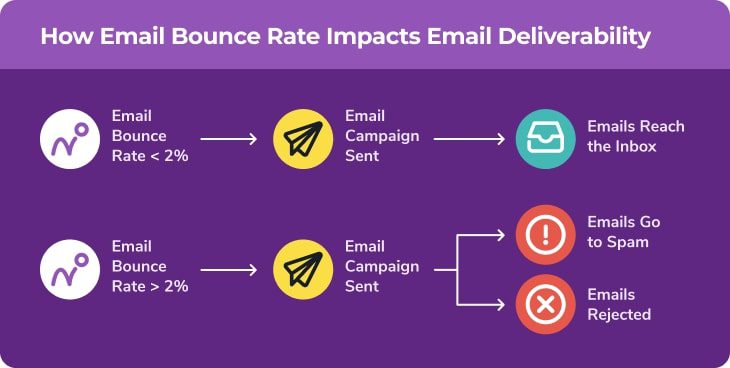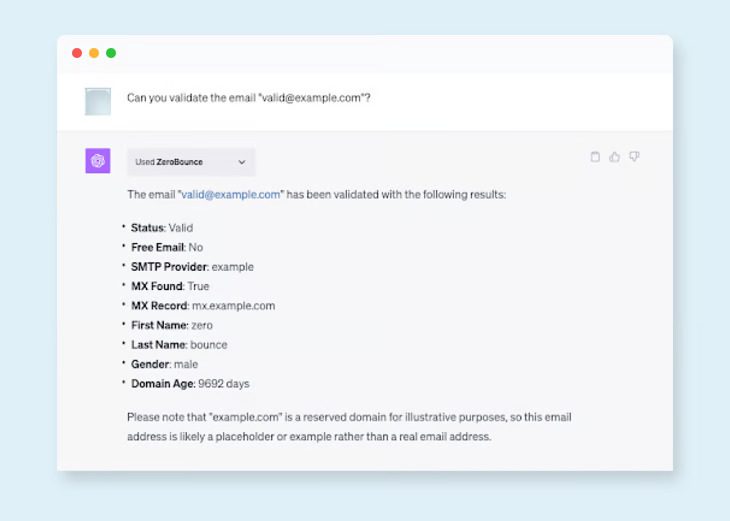
How AI and Large Language Models Are Improving Email Validation
Email validation used to be a straightforward process — just checking whether an email address was active and capable of receiving messages. But with AI and large language models, email validation has entered a new frontier.
Beyond confirming that an address exists, email validation also examines whether sending messages to that address could harm your sender reputation. After all, some addresses can be risky, disposable, or highly corrosive if you email them.
Now, with the rise of artificial intelligence (AI) and large language models (LLMs), email validation is becoming more sophisticated. These advanced tools can do more than simple syntax checks. AI and LLM can analyze patterns and spot potential threats. They can even predict the likelihood that an email address will bounce or be marked as spam.
By using AI and LLMs, email validation is evolving into a smarter, faster, and more reliable way to keep your email lists clean and effective.
Let’s take a closer look at how these technologies are changing the game.
What AI and LLMs are
Artificial intelligence (AI) essentially teaches computers to think and act like humans — learning from data, making decisions, and even reasoning through complex problems. It’s about creating systems that can adapt, learn, and improve over time.
Large language models (LLMs) are a specific type of AI trained on large amounts of text. LLMs are designed to understand, generate, and analyze human language in a way that’s surprisingly natural. LLMs can detect patterns, read context, and even predict what comes next based on extensive data analysis. Think of them as the brains behind many of the smart tools we use every day, from chatbots to advanced email validation systems.
But what is email validation?
Email validation is the process of verifying that an email address is “valid,” which means it’s accurate, properly formatted, and able to receive messages. It helps ensure that the addresses on your list actually belong to real people and aren’t fake, mistyped, inactive, or harmful (like spam traps).
Email lists are more like bread than wine. They go stale. Between a quarter and one-third of email lists spoil every year. So what does that mean for you?

It means validating emails is necessary because:
- It protects your sender reputation
- Improves deliverability
- Keeps your marketing or communication efforts efficient and cost-effective.
Sending emails without validation means you’ll be sending messages to email addresses that are either inactive or worse. If you skip regular email validation, you risk wasting resources, getting high bounce rates and even being blacklisted by email service providers.
How AI is reshaping email validation
AI-powered email validation tools go far beyond basic checks like verifying syntax or confirming that an email address exists. Today’s advanced systems use sophisticated algorithms to identify patterns associated with risky addresses — like temporary email services, fraudulent domains, or known spammers.
By analyzing behavioral data and domain reputation, AI can accurately determine lots of pertinent information about any address. Is it valid? Active? Disposable?
Of utmost importance – is the address harmful to you if you use it? This kind of precision not only helps you maintain clean email lists but also protects your sender reputation from being dragged down by risky contacts.
How LLMs bring context and deeper understanding to email validation
Large language models (LLMs) add a powerful layer of intelligence to email validation. Unlike traditional systems that just look at the surface, LLMs can analyze the context and intent behind email addresses.
For instance, they can:
- assess domain credibility
- spot anomalies in email syntax
- and even detect phishing attempts based on patterns found in past data.
By digging deeper into the context of each address, LLMs can more accurately flag malicious domains or predict potentially risky email behavior. This level of contextual understanding makes email validation smarter and more effective.
The big benefits of AI and LLMs in email validation
When it comes to email marketing, quality beats quantity every time. AI and large language models (LLMs) make it easier to maintain clean, accurate lists that get results.
From boosting deliverability to increasing engagement, here’s how AI-powered validation is changing the game.
Better list quality: Removing risky or disposable addresses ensures your messages reach real people who are more likely to engage.
Improved email deliverability: When your email list is accurate and up-to-date, your messages are more likely to land in the inbox instead of bouncing back or getting flagged as spam.
Cost efficiency: Reducing bounces means you’re not wasting resources sending emails that will never be read. That translates to better ROI and less wasted effort.
Higher Engagement: A verified email list with real, active addresses leads to more opens, clicks, and conversions. It’s not just about sending more emails – it’s about sending them to the right people.

Real-world tools using AI for smarter email validation
AI and LLMs aren’t just theoretical — platforms like ZeroBounce, BriteVerify, and Hunter are already using them. These tools use AI-driven algorithms to verify email addresses. Moreover, AI helps with other complementary necessities, like assessing domain reputation, and detecting disposable or temporary email services in real time.
The result? Businesses get actionable insights that help them maintain clean, high-quality email lists, reducing bounces and protecting their sender reputation.
Validate email addresses instantly with ZeroBounce’s ChatGPT plugin
Hundreds of millions of people use ChatGPT every day – and if you’re one of them, you can validate email addresses right on the platform.
ZeroBounce offers a ChatGPT plugin that makes real-time email verification even easier for you. This integration lets you validate email addresses – either individually or in bulk – without leaving the ChatGPT interface.
What does the ZeroBounce – ChatGPT plugin do
- Real-time verification: Simply input an email address or a list of addresses into ChatGPT, and receive immediate validation results.
- Free trial: ChatGPT Plus users can verify up to three email addresses per hour without needing a ZeroBounce account.
- Bulk email validation: For larger lists, connect your ZeroBounce account by providing an API key to ChatGPT to enable bulk email verification.
- User-friendly setup: Install the ZeroBounce plugin from the ChatGPT Plugin Store, and start verifying emails through natural language prompts.
This integration is particularly beneficial if you’re a marketer, sales pro, or looking to maintain clean email lists, reduce bounce rates, and improve deliverability.
To get started, install the ZeroBounce plugin from the ChatGPT Plugin Store and begin verifying emails directly within your ChatGPT Plus account.

The future of AI in email validation
Looking ahead, AI and LLMs are likely to play an even bigger role in email validation. Predictive analytics could soon help businesses identify potential threats before they happen, while deeper domain analysis and behavioral tracking could pinpoint risky addresses more effectively.
We may also see AI-powered systems integrating with CRM platforms to provide predictive scoring, user segmentation, and insights based on email interaction patterns.
As these technologies continue to evolve, staying ahead of the curve will be essential for businesses that want to get the most out of their email marketing efforts while protecting their sender reputation. More marketers realize how valuable a curated email list is, so they’ll do anything to preserve it.
Table of Contents
- What AI and LLMs are
- But what is email validation?
- How AI is reshaping email validation
- How LLMs bring context and deeper understanding to email validation
- The big benefits of AI and LLMs in email validation
- Real-world tools using AI for smarter email validation
- Validate email addresses instantly with ZeroBounce’s ChatGPT plugin
- What does the ZeroBounce – ChatGPT plugin do
- The future of AI in email validation






